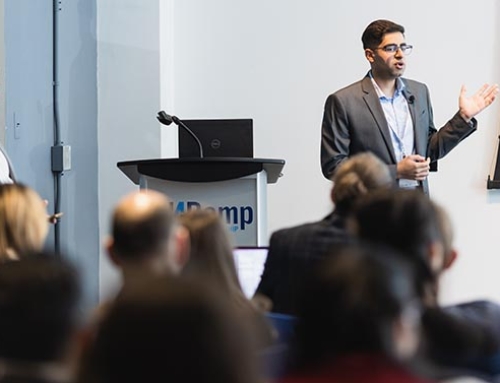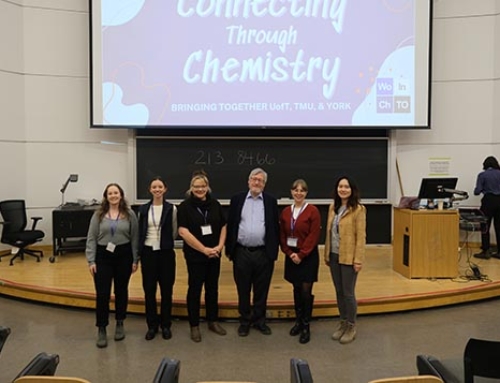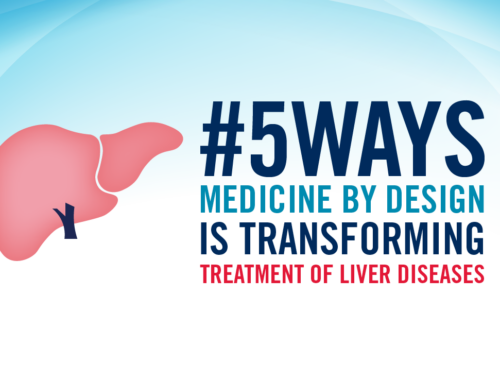
The Medicine by Design symposium is an annual event celebrating regenerative medicine in the Medicine by Design community and beyond. (Photo of 2019 symposium by Neil Ta.)
Please visit the symposium web page to learn more about or register for Medicine by Design’s 7th Annual Symposium.
The future of regenerative medicine is driven by important and challenging questions.
On Dec. 8, through presentations by regenerative medicine leaders, the Medicine by Design symposium will explore some of these questions: Can we use synthetic biology to create tissues that outperform nature? What do we learn from physics and new technologies that deconstruct cell identity? How do we translate epigenetics into therapies? And how do we develop cell therapies that are accessible and affordable to all?
“The annual symposium gives us the opportunity to bring together leading minds in regenerative medicine not only from the Medicine by Design community in Toronto, but from influential institutions in the U.S. as well,” says Michael Sefton, who is the scientific director of Medicine by Design.
“This year, the symposium’s theme is ‘Grand Questions in Regenerative Medicine.’ We will explore some of the intriguing questions in regenerative medicine, through presentations that aim to inspire new ideas and collaborations,” adds Sefton, who is also a University Professor at the Institute of Biomedical Engineering and the Department of Chemical Engineering & Applied Chemistry, University of Toronto (U of T).
Held at the MaRS Auditorium (101 College St., Toronto), the symposium will be in-person for the first time since 2019. The all-day event will also feature a trainee poster competition that showcases work from Medicine by Design-funded labs.
The symposium will feature talks by regenerative medicine experts who are performing cutting-edge research that is defining the future of human health.
Medicine by Design will welcome the following slate of external speakers:
- Thomas Rando is the director of the Broad Stem Cell Research Center at the University of California Los Angeles, where he is also a professor in the Department of Neurology and Molecular, Cell, and Developmental Biology. His lab focuses on muscle stem cell biology, muscle stem cell aging, muscular dystrophies, tissue engineering and basic muscle cell biology.
- Samantha Morris is an associate professor in the Department of Developmental Biology and Genetics at Washington University in St. Louis. The Morris lab focuses on cell reprogramming and single cell biology.
- Cliona Rooney’s lab at Baylor College of Medicine is focused on improving immunotherapies for virus-associated diseases and malignancies using cytotoxic T lymphocytes (CTLs). Rooney is a professor in the Departments of Pediatrics, Molecular Virology and Microbiology, and Pathology and is the director of Translational Research Laboratories of the Center for Cell and Gene Therapy in Houston.
- Karmella Haynes is an assistant professor at the Wallace H. Coulter Department of Biomedical Engineering at Georgia Tech and Emory University in Atlanta. The Haynes lab uses gene and protein engineering to create new epigenetic machinery that regulates DNA at will.
- Aviv Regev is a single cell genomics pioneer, and a computational and systems biologist focusing on gene regulatory circuits. She is co-founder of the Human Cell Atlas project, an international effort to map every human cell. Regev is head and executive vice president of Genentech Research and Early Development, Genentech.
Several Medicine by Design-funded investigators who are working in areas related to the symposium’s themes will also speak:
- Michael Garton – assistant professor, Institute of Biomedical Engineering, U of T
- Penney Gilbert – associate professor, Institute of Biomedical Engineering, U of T
- Kristin Hope – senior scientist, Princess Margaret Cancer Centre, UHN
- Sevan Hopyan – senior scientist, Program in Developmental and Stem Cell Biology, and orthopaedic surgeon, The Hospital for Sick Children
- Mathieu Lupien – senior scientist, Princess Margaret Cancer Centre, University Health Network (UHN)
- Alison McGuigan – professor, Department of Chemical Engineering & Applied Chemistry, U of T
- Keith Pardee – associate professor, Leslie Dan Faculty of Pharmacy, U of T
Garton, Hopyan, McGuigan and Pardee all lead projects within Medicine by Design’s Grand Questions Program and will present their teams’ approaches to defining new frontiers in regenerative medicine through integrating synthetic biology, stem cell biology, physics, and engineering.
The symposium will also feature talks from Medicine by Design trainees Katie Teng (Sinai Health System), Kyle Reid (UHN), Wendy Wang (U of T) and Juan Zhang (Sinai Health System) and 40 posters presented by post-doctoral fellows and graduate students in Medicine by Design labs. A panel of judges will select top posters for prizes, sponsored by STEMCELL Technologies, BlueRock Therapeutics and CCRM, to be announced at the end of the symposium.
Sefton, whose lab is located at the Donnelly Centre for Cellular and Bimolecular Research, says the annual symposium, in addition to being a forum to share knowledge and spark convergence, is a chance to celebrate the cutting-edge advances made in the Medicine by Design community.
“Our more than 170 Medicine by Design-funded researchers and 1000 trainees are working hard on fundamentally impacting the understanding and treatment of disease and developing technologies to enable regenerative medicine innovations. At the symposium, we’ll highlight and celebrate their world-leading, transformational research not only in the past year, but since Medicine by Design’s founding in 2015.”
Registration will close on Mon., Dec. 5, or once full.
About Medicine by Design
Medicine by Design builds on decades of made-in-Canada excellence in regenerative medicine dating back to the discovery of stem cells in the early 1960s by Toronto researchers James Till and Dr. Ernest McCulloch. Regenerative medicine uses stem cells to replace diseased tissues and organs, creating therapies in which cells are the biological product. It can also mean triggering stem cells that are already present in the human body to repair damaged tissues or to modulate immune responses. Increasingly, regenerative medicine researchers are using a stem cell lens to identify critical interactions or defects that prepare the ground for disease, paving the way for new approaches to preventing disease before it starts. Medicine by Design is made possible thanks in part to a $114-million grant from the Canada First Research Excellence Fund.





